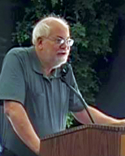
Page last updated: November 23, 2018
All pages copyright © 2018 by Pinyon Publishing
WIRES OVER THE HOMEPLACE
by Paul Dickey
Wires Over the Homeplace is a late eighteenth-century Pennsylvania frontier of ancestors clearing fields across America to raise young families and new generations. It’s also a coming-of-age story for a postmodernist computer programmer retiree in the early twenty-first century writing his second book of poetry. Somewhere it may contain a story snatched from your own heart.
Wires happens in places that once were prairies, wheat fields, ball fields, hospital waiting rooms, and schools—and occupied by jack rabbits, snakes, and rusted tractors in the fields. The only constant may be the dark birds perched on the wires. The cinematography is Dickeyville, Wisconsin; Iowa; Wichita; Oklahoma; and Omaha.
At this very minute, or perhaps the moment you start to read, the book means what it says, which is a Great Plains value. In the book though, much will happen and meaning can’t always be rigidly predicted and controlled. You’ll drive the I-80 Interstate through Iowa and buy nails or a bucket of paint in an old hardware store in Weeping Water, Nebraska. A lovely young lady will buy a loaf of bread. You might get hungry for your own grandma’s homemade sausage biscuits and gravy. You’ll discuss ovenbirds with Bertrand Russell.
At times the road may make a sudden jump and you won’t be prepared. That’s just life, the old-timers say. You do have your seat belt on, right? It’s the law these days. If the book gets heavy from holding it at an awkward angle, lay it down for a spell. Bottom line, if we get lucky, you might look up and see these Wires Over the Homeplace, perhaps as you yourself always knew them, but hadn’t thought about for a time or hadn’t even known you knew.

PRAISE FOR WIRES OVER THE HOMEPLACE
“Wires Over the Homeplace welcomes the haunting of its forebears, both poetic and personal. Indeed, as Dickey attends to the narratives, gestures, and cadences of the Midwest, those sources are brilliantly conflated. So it is that one speaker praises his father by noticing that the man ‘had his own way about words, folks / and things. He respected every tool. Everything / inhabited its own place.’ The same could be said of this poet whose candor so honors his subjects. Dickey’s way about words—subtle, reserved, but unabashedly tender—is purely his own.”—GEORGE DAVID CLARK, Editor of 32 Poems
 PAUL DICKEY is a poet and philosophy instructor in Omaha and has published poetry, fiction, plays, poetry book reviews, and creative non-fiction in over one hundred literary journals. He gives poetry readings and prose poetry workshops throughout the Midwest in colleges and elsewhere.
PAUL DICKEY is a poet and philosophy instructor in Omaha and has published poetry, fiction, plays, poetry book reviews, and creative non-fiction in over one hundred literary journals. He gives poetry readings and prose poetry workshops throughout the Midwest in colleges and elsewhere.Dickey’s recent books include They Say This is How Death Came Into the World (poems), The Good News According to St. Dude (a play), and Liberal Limericks of 2012 (a collection of humorous political poems). His work has appeared in Pleiades, Bellevue Literary Review, Laurel Review, Prairie Schooner, Memoir (and), 32 Poems, Potomac Review, Hampden-Sydney Poetry Review, Pinyon Review, and Clements and Dunham’s An Introduction to the Prose Poem.